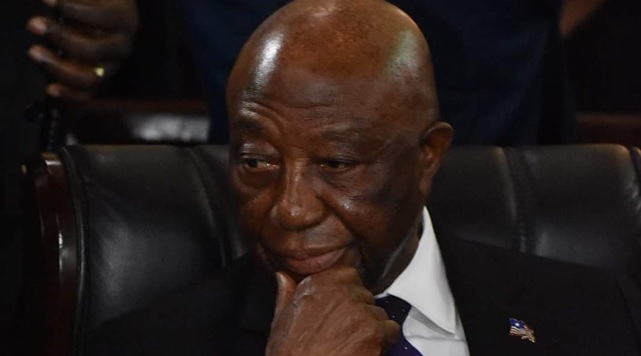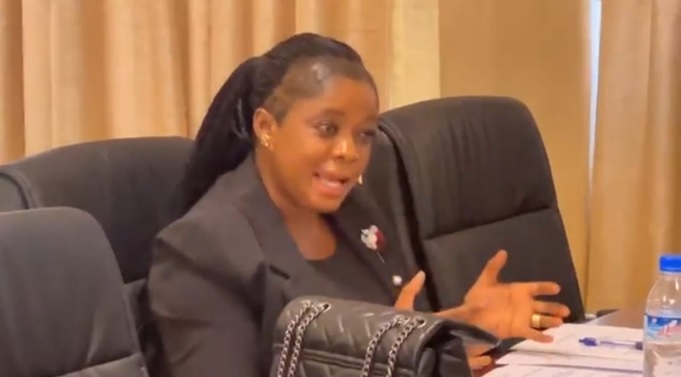MONROVIA, LIBERIA – Senator Edwin Snowe’s recent statement, declaring the administration of President Joseph Nyuma Boakai as a “one-term government,” echoes a growing sentiment that is difficult to ignore. On Thursday, January 30, while addressing the newly appointed Central Bank of Liberia (CBL) Governor-designate, Henry Saamoi, Snowe stated, “From all indications that the UP Government is a one-term government.” Snowe, a member of the opposition National Patriotic Party (NPP) and a seasoned political figure, has long been vocal about the administration’s shortcomings. His remark is not just a political jab, it reflects the deepening frustration across Liberia as corruption appears to be defeating the Boakai administration.
Boakai’s rise to power was fueled by promises of accountability, transparency, and a break from past governance failures. However, nearly a year into his presidency, corruption scandals, mismanagement, and questionable financial decisions are eroding public trust. Instead of delivering the sweeping reforms he pledged, his administration is making costly governance blunders, none more glaring than the case of former CBL Governor J. Aloysius Tarlue.
The Supreme Court of Liberia recently approved the voluntary dismissal of the legal battle between Aloysius Tarlue and the Executive Branch after both parties reached a mutual agreement. Tarlue had initially filed a writ of prohibition against his suspension by President Joseph Boakai, which was based on a July 2024 audit report from the General Auditing Commission (GAC). The report revealed that under Tarlue’s leadership, the Central Bank of Liberia (CBL) lent the government $83 million in November and December 2023 without the necessary approvals. It also found that the CBL awarded contracts worth $11 million during the review period without competitive bidding, hired 40 staff members without evidence of proper authorization, and withheld taxes and contributions from some employees without remitting them to the relevant agencies. The audit covered the period from 2018 to 2023.
Despite these findings, the case was dropped after the government opted for a settlement, resulting in Tarlue walking away with a staggering US$374,000. This payout only occurred because President Boakai violated the law in removing him. Instead of following due process, the administration’s misstep ultimately forced Liberia to bear the financial consequences of the president’s unlawful decision.
This hasty handling of governance is exactly what fuels growing disillusionment with the Boakai administration. Snowe’s critique carries weight because it speaks to a broader truth: corruption and poor decision-making are pushing the government toward failure. The administration’s reluctance to take strong action against corruption has allowed scandals to multiply. Investigations by the Liberia Anti-Corruption Commission (LACC) have exposed irregularities, yet meaningful consequences remain rare. The usual pattern, suspensions without real accountability, has only reinforced public skepticism.
During his address, Snowe questioned how Henry Saamoi would feel if a future government in 2030 were to take similar actions against him as those taken against Tarlue. His remark highlights a crucial issue: the Boakai administration is setting dangerous precedents that could destabilize Liberia’s governance long after he leaves office. If officials continue to act without regard for legal frameworks, Liberia will remain trapped in a cycle where every new government reverses policies, disrupts institutions, and settles political scores.
The implications of these governance failures stretch beyond politics. Liberia’s economic woes, struggling infrastructure, and poor public services all stem from an administration that appears unable, or unwilling, to control corruption. While Boakai engages in diplomatic trips and international engagements, the real battle for his administration’s survival is being lost at home. His inability to deliver results fuels the perception that he is out of touch with the realities facing ordinary Liberians.
Snowe’s statement is not just opposition rhetoric, it is a warning. If corruption continues to define this government, the Unity Party’s chances of securing a second term will fade fast. The solution is clear: Boakai must take decisive action against corruption, enforce transparency, and stop the governance blunders that cost Liberia millions. Otherwise, the administration’s failure will not be written by the opposition but by its own missteps.
At this rate, Snowe’s prediction may not just be a political remark but a prophecy that will define the end of the Boakai presidency.







